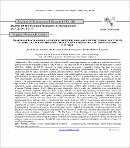| dc.contributor.author | Siminyu, Jacob Shems | |
| dc.contributor.author | Kyamanywa, Teopista Nalule | |
| dc.contributor.author | Kayondo, Twaha William | |
| dc.date.accessioned | 2023-03-21T11:19:35Z | |
| dc.date.available | 2023-03-21T11:19:35Z | |
| dc.date.issued | 2016-03 | |
| dc.identifier.citation | Siminyu, J. S., Kyamanywa, T. N., & Kayondo, T. W. (2016). Journal Of Harmonized Research (JOHR). Journal Of Harmonized Research in Management, 2(1), 46-78. | en_US |
| dc.identifier.uri | https://hdl.handle.net/20.500.12504/1266 | |
| dc.description.abstract | This study examined the effect of staff training programs on employee performance in the
public sector in Uganda taking a case study of the Directorate of Citizenship and Immigration Control
(DCIC). While the DCIC engaged in staff training programs especially during the past ten years,
employee performance remains wanting. The unsatisfactory performance at the DCIC is majorly
characterized by long customer queues, delayed service delivery and continued customer complaints.
The study therefore sought to establish whether the staff training programs have had any effect on the
performance of employees in the public sector – taking DCIC as a representative case study. A total of
205 respondents, including 110 employees, 9 key informants and 86 customers, participated in the
study. A questionnaire and two structured interview guides were used to gather primary data.
Quantitative data was analyzed using descriptive and inferential statistics, while qualitative data were
analyzed using pragmatic content analysis, (Trochim, 2006). The validity was ensured by using
Content Validity Index (CVI) (Mugenda and Mugenda, 2003) while the reliability was established by
using Cronbach Alpha Coefficient Test (Amin, 2005). The first study finding revealed that short term
training courses had a moderate positive effect on employee performance at the DCIC. This meant that
employee performance was quite wanting particularly in terms of the quality, efficiency and
effectiveness of the services delivered to the customers. The second finding confirmed that career
enhancement techniques had a significant but weak positive effect on employee performance at the
DCIC. The research results further established that both staff attitude and work environment had a
significant positive relationship with employee performance at the Directorate of Citizenship and
Immigration Control in Uganda. The generated model ranked staff attitude, work environment as the
highest contributors to employee performance followed by short term training programmes and career
enhancement techniques respectively. On the basis of the findings, it was recommended that the
working environment should be improved by first motivating staff with both equitable direct and
indirect rewards and then facilitates them with the necessary equipment as priority. Then short term job
related training programmes should be run using appropriate training techniques in effort to improve
staff performance. | en_US |
| dc.language.iso | en | en_US |
| dc.publisher | Journal of Harmonized Research (JOHR) | en_US |
| dc.subject | Public sector, | en_US |
| dc.subject | Immigration Control, | en_US |
| dc.subject | Characterized, | en_US |
| dc.subject | Performance, | en_US |
| dc.subject | Short term training, | en_US |
| dc.subject | Entry permit, | en_US |
| dc.subject | Visa, | en_US |
| dc.subject | Pass | en_US |
| dc.title | Training programmes and employee performance in the public sector in Uganda: a case of the directorate of citizenship and immigration control | en_US |
| dc.type | Article | en_US |

